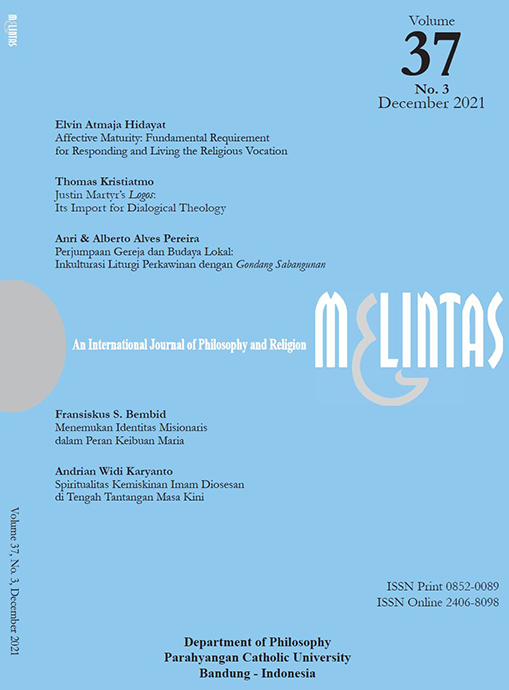Affective Maturity: Fundamental Requirement for Responding and Living the Religious Vocation
DOI:
https://doi.org/10.26593/mel.v37i3.7090Keywords:
affective maturity, religious vocation, self integration, internalization, transcendence, transformationAbstract
In the Catholic Church, there are three ways or states of life: (1) married life, (2) celibate life as priest or religious, and (3) celibate life as lay person. Ideally, each individual can only choose one of these three states of life for the rest of his or her life. Therefore, in order to be able to choose and to live their life choices responsibly, an individual is required to have maturity in physiological, emotional, intellectual, and interpersonal aspects. This article attempts to describe one of the aspects of human maturity, namely the “affective (emotional) maturity”, in relation to the choice of celibacy as a religious person. The significance of human affectivity lies in its correlation with other aspects of maturity. Affectivity is a ‘machine’ for an individual that is more than intelligence or spiritual facts. It is connected with human biological reality as a force or a drive that enables individuals to act or behave. As is well known, vocation to the religious life (to become a priest, monk, or nun) in the Catholic Church is marked by the commitment of the person to live the three evangelical values: obedience, poverty, and chastity. Those called to religious life are obliged to behave and to be oriented in accordance to their vows. In this context, affective maturity becomes a measuring tool as well as a fundamental requirement to be able to respond to and to live this demanding religious vocation.
Downloads
Published
Issue
Section
License
Copyright (c) 2023 Elvin Atmaja Hidayat

This work is licensed under a Creative Commons Attribution-NonCommercial 4.0 International License.
MELINTAS applies the Creative Commons Attribution (CC BY NC) license to articles and other works we publish. If you submit your paper for publication by MELINTAS, you agree to have the CC BY NC license applied to your work.


